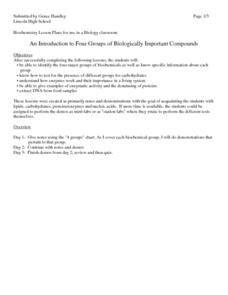Discovery Education
Blueprint for Life
DNA is the code for all biological traits, both plant and animal. Using an exploratory lesson, learners begin to explore the concept of a biological code by decoding word puzzles. They then extract DNA from plant cells using detergent to...
Biology Junction
Biochemistry of Cells
Chemistry and biology work hand in hand, without one you literally wouldn't have the other. Using a presentation, individuals learn about plant cells, animal cells, cell responses, macromolecules, DNA bases, and so much more. A worksheet...
Curated OER
An Introduction to Four Groups of Biologically Important Compounds
Students learn about the four biochemicals that are important biologically. In this biochemicals lesson plan, students identify the four major groups of biochemicals including carbohydrates, proteins, lipids and nucleic acids. They are...
Curated OER
How Do Antiretroviral Drugs Work?
In this biology worksheet, high schoolers watch a series of videos and complete 10 short answer questions right after. They explain how ART drugs interrupt the life cycle of HIV.
Curated OER
DNA and RNA
Tenth graders research the history and discovery of DNA. Using their text, they label a basic DNA structure and the composition of genes. They explain how RNA and DNA differ from one other and discuss the processes of transcription and...
Curated OER
DNA Isolation from Onion
Students apply measurement skills using the metric system. They explain the process of isolating DNA from other cell contents. They apply knowledge of cell structure to explain the process of isolating DNA.
Curated OER
DNA Replication
Pupils construct a 3-D model of DNA. They demonstrate an awareness of base pairs in written work and in a model. Students model DNA replication using edible materials. They record concluding thoughts in their science notebooks.
Curated OER
DNA Fingerprinting with Restriction Enzymes
Students will illustrate how restriction enzymes work by piecing together parts of a puzzle. Then they apply this knowledge to help them analyze genetic evidence from the scene of a crime as well as to help them comprehend how a DNA...
Curated OER
Cloning of Plasmid and Spinach DNA
Students ligate fragments of genomic DNA from spinach into a vector plasmid. They perform a restriction enzyme digestion. Student use a ligated DNA molecule to transform E. coli cells. Students analyze their procedures and outcome of...
Curated OER
DNA Recombination II
Students model recombination in DNA. They color the DNA sample and cut it out. Students use their "restriction enzymes" to cut the DNA into specific fragments. They separate the fragments using the "gel electrotrophoresis." Students...
Curated OER
DNA Replication
Young scholars work with a partner to answer any unanswer questions on their review sheet. They work in groups of 4 to make flash cards as study aides. Students play a review game for the remaining of the class period. The winning...
Curated OER
The Cloning of Plasmid and Spinach DNA
Students will first extract genomic DNA from spinach and perform a restriction enzyme digestion on both the spinach DNA and the plasmid using the same restriction enzyme. They then ligate the cut plasmid DNA with the cut spinach DNA in...
National Nanotechnology Infrastructure Network
Silver and Bandages: Assessment of Inhibition of Bacteria by Silver Colloid-Impregnated Bandages
Silver: more than jewelry, it's also a natural antimicrobial agent. An inquiry-based lesson asks collaborative groups to design and implement an experiment to test this property. Using samples of silver nanoparticles and a strain of...
Curated OER
Who Done It?
Pick and choose which activities to include in this crime scene investigation. Junior detectives can examine fingerprints, DNA, blood samples, or bone structure. The plan suggests you have teams solve a mystery, but it does not...
Cherokee County Schools
Dragon Genetics
It's alive! Turn young biologists into mad scientists with this engaging genetics activity. Using their knowledge of chromosomes and genes, students create dragons with unique sets of traits,...
Howard Hughes Medical Institute
Mapping Genes to Traits in Dogs Using SNPs
Genetic analysis has gone to the dogs! Learners use real DNA information collected from dog saliva to study the relationship between genotypes and phenotypes. They analyze alleles to determine correlations to coat color, length, and...
Curated OER
Constructing a Phylogenetic Tree
Students are given the opportunity to analyze DNA sequence differences between organisms in order to establish a reasonable picture of the evolutionary relationships between them (Phylogenetic Tree). In the simulation form they are...
Curated OER
Electrophoresis Analogy
Students participate in a simulation of electrophoresis separation of DNA fragments. They link arms to form DNA fragments with each student representing a nucleotide. As they move through an obstacle course they discover how fragments...
Curated OER
Reading the Code
In this DNA worksheet, students access a website to read about the scientists who make significant contributions to the DNA puzzle. Students complete 7 short answer questions based on the reading. Then students complete 3 short answer...
Curated OER
Blue Genes: Affect Your Life!
Students, in groups, research, analyze and synthesize information on genetic diseases. After watching a video on genetics, groups perform research on a variety of genetic diseases and present their findings to the class.
Curated OER
Genes
Students explore the history, inheritance and mutations of genetics. In this genetic lesson students complete experiments on DNA sequences.
Curated OER
Who Done It?
Learners work in groups to solve various murder mysteries using DNA evidence to implicate suspects. Teams compete to solve the crimes the fastest, while using various scientific methods to accomplish their task.
Curated OER
Microarrays: Chipping Away at the Mysteries of Science and Medicine
Students research microarrays on the internet in cooperative groups. Students write an essay describing the use of microarrays in environmental research and in medicine.
Curated OER
The Effect of Natural Selection on Genes, Traits and Individuals
Rotating through five stations, evolutionary biologists explore the question of how changes in DNA facilitate the changes in a population over time. High-quality, colorful cards of animals, skeletons, skulls, and DNA sequences can all be...

























